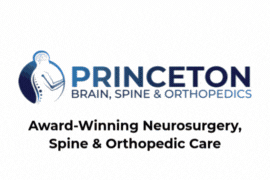Princeton, NJ Health Care Guide Articles
Most recent posting below. See other articles in the "Other Articles" section at the bottom.
Mood and Food: Mindful Eating
At Suppers, we talk a lot about how what we eat can affect how we feel physically and emotionally. Eating mindfully is not about what you eat, but how and why you eat. It is not about judging your choices or yourself but instead focuses on the here and now of eating. Slowing down and paying attention to both your physical and emotional cues can reduce your perception of stress, physical pain, anxiety and depressive thoughts, as well as promote greater problem-solving ability, self-compassion, creativity, self-confidence, learning, and well-being.
“We’re living in a time that is really, for most of us, is unprecedented,” said Dr. Joseph Wieliczko, Psy.D. “We are home-bound. We are stressed out. We are emotionally, physically, socially, and economically taxed on so many levels. There is no time greater than now to start to utilize mindful eating and mindfulness practices.”
Here is an example of the unconscious eating most of us do:
Think of the first bite of a food you love...maybe it is a piece of chocolate. You have been looking forward to enjoying it and the saliva builds in your mouth as you unfold the wrapper. You bite into it and are totally immersed in its sweetness, richness, and smoothness. It is so delicious, and you are happy to be eating it. Then you begin to talk with the person you are sitting with, or glance back up to the TV, and the flavor in your mouth decreases. Then you are chewing without noticing the chocolate at all, and it has disappeared before you realize it.
Mindful eating is about recreating that “first bite” delight in each bite of your food. When your mind is disengaged from eating, you are not satisfied and seek out more food, even when you are full. When you connect with your eating experience, reflect on the source of the food, those who prepared it, those eating around you, and the sensations in your body, you will feel more satisfied regardless of what or how much you are eating.
Why should you eat mindfully?
- It can lead to positive and lasting change, because eating mindfully is not about restrictive diet choices.
- Food becomes something to enjoy, rather than a temptation or regret.
- It slows down the pace of your meals, allowing your brain time to hear the “I’m full” signals from your stomach, which may help weight loss.
- It optimizes digestion. Some research has shown that when our attention is not focused on eating, our digestive process is 30-40% less effective than it should be, which leads to gas, bloating, and discomfort.
- Mindfulness can increase your awareness of the source of your food, which encourages buying local and/or organic if you are able.
- Mindful eating with family fosters deeper connection. It also allows you to model healthy eating behaviors for your children. (No “clean plate” club!)
An Introductory Exercise (Try this with a friend!)
- Take one bite of an apple slice and then close your eyes. Do not begin chewing yet. Try not to pay attention to the ideas running through your mind, just focus on the apple. Notice anything that comes to mind about taste, texture, temperature and sensation going on in your mouth.
- Begin chewing now. Chew slowly, just noticing what it feels like. It's normal that your mind will want to wander off. If you notice you're paying more attention to your thinking than to the chewing, just let go of the thought for the moment and come back to the chewing. Notice each tiny movement of your jaw.
- In these moments you may find yourself wanting to swallow the apple. See if you can stay present and notice the subtle transition from chewing to swallowing.
- As you prepare to swallow the apple, try to follow it moving toward the back of your tongue and into your throat. Swallow the apple, following it until you can no longer feel any sensation of the food remaining.
- Take a deep breath and exhale. Reflect: What did you notice while chewing? Why did you swallow? Was the food no longer tasty? Did it dissolve? Were you bored?
Each bite does not need to be consumed as meticulously as this exercise. Do this with the first bite of each meal, and you will lay the groundwork of mindfulness for the other bites too.
“We all have distracted minds, said Wieliczko. “Guided meditations and short videos can be helpful for beginners. The more we practice this, the better we get at anchoring ourselves and we can really better understand our relationship with food.”
For more information and resources about mindful eating, click here.
References
A Neurologist Looks at Mind and Brain: “The Enchanted Loom.” Phiroze Hansotia, MD. US National Library of Medicine, National Institutes of Health. https://www.ncbi.nlm.nih.gov/pmc/articles/PMC1069062/
How to Develop a Mindful Eating Practice Three-Part Webinar Series. Dr. Joseph Wieliczko, Psy.D. https://www.thesuppersprograms.org/content/mindful-eating-and-mindfulness-training-webinars
Jay’s Story: Mindful About My Brain. https://www.thesuppersprograms.org/content/jays-story-mindful-about-my-brain
Principles of Mindful Eating. The Center for Mindful Eating. www.tcme.org. https://www.thesuppersprograms.org/sites/default/files/Principles%20of%20Mindful%20Eating.pdf.
University of Wisconsin Integrative Medicine www.fammed.wisc.edu/integrative. https://www.thesuppersprograms.org/sites/default/files/handout_mindful_eating.pdf.
Other Articles
No More Articles Exists.
By Date
2023
-
June (1)
-
May (1)
-
March (1)
-
January (3)
2022
-
August (3)
2021
-
November (1)
-
February (1)
-
January (1)
2020
-
November (3)
-
October (1)
-
July (2)
-
May (1)
2019
-
December (2)
-
September (1)
-
March (1)
-
February (1)
2017
-
February (1)
2016
-
October (1)
-
February (1)
2014
-
May (1)
2013
-
February (1)
2012
-
January (1)
2009
-
September (1)








